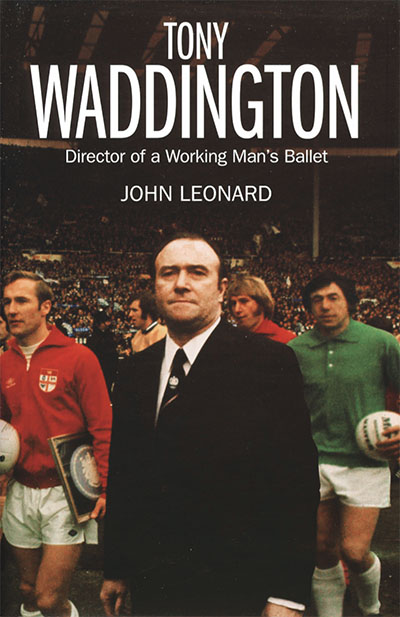
Pitch Publishing, £16.99
Reviewed by Andy Thorley
From WSC 384, March 2019
Buy the book
It is doubtful that Tony Waddington’s name resonates as much as it should these days, but Stoke City supporters see him as the greatest manager in the club’s history. There is a Tony Waddington Suite at the club’s stadium and a road named after him on the Trentham Lakes complex where the ground is housed. Generations of fans have had tales handed down to them about “Waddo’s” team. We’re told that they would have won the League in 1975 but for injuries, and the FA Cup a few years before but for Arsenal cheating in the semi-final (and sorry, Sky, that’s the reason we hate the Gunners, nothing to do with Aaron Ramsey’s leg).
Author John Leonard, formerly an editor at ITV Sport and Channel 5, tells the story of his subject from the limited playing career at Crewe cut short by injury, to his quarter of a century at the Victoria Ground as coach, assistant and manager, the book’s title coming from the phrase that Waddington often used to describe football. It is all here: the inspired signings, the way he reinvigorated the club by bringing back Stanley Matthews in 1961, the audacious transfer bids that didn’t come off (George Best, Peter Osgood) and the ones that did (Gordon Banks, Alan Hudson), the League Cup win against Chelsea in 1972 and all the agony of the near misses.
Most of the story has already been told, though, and perhaps because of Leonard’s background as a news editor, the book relies heavily on secondary sources. Given that Leonard is a fan who lived through the good times and the bad, there could have included more personal anecdotes. Still, there are some fresh interviews with the likes of Stoke’s current chairman Peter Coates (who invited Waddington onto the board, where he remained until his death in 1994) and Angela Smith, the former squash champion who is now chair of the Stoke Fans Council.
It is striking how quickly it all unravelled for Waddington once the roof blew off one of the stands in January 1976. The heavily in debt Potters – Waddington twice broke the world-record fee for goalkeepers, a staggering fact for a club the size of Stoke – weren’t fully insured and his best players had to leave; Waddington quit in March 1977, two months before relegation. Maybe some greater insight about his post-Stoke years would have been interesting too – indeed there is little to be seen anywhere about his life away from football.
Director Of A Working Man’s Ballet is a window into a different era, one where the manager was in control of everything from transfers to how long the grass was. Mostly, though, it is a loving retelling of Stoke City’s greatest era and the club’s fans will find much to enjoy in it – even if they already know the stories. Whether it appeals more broadly than that is doubtful, but that, you suspect, was never the point.